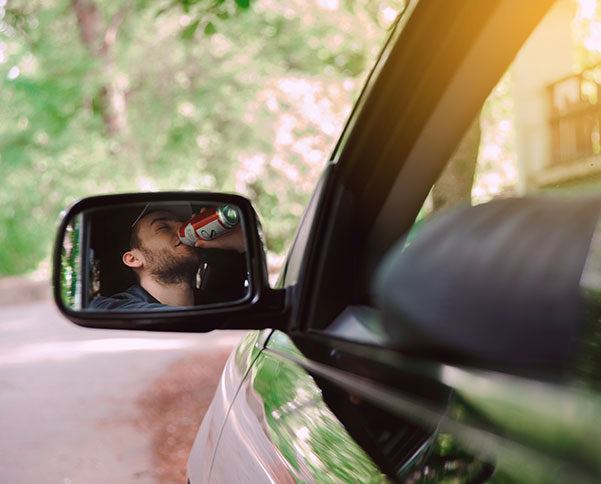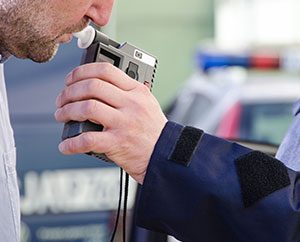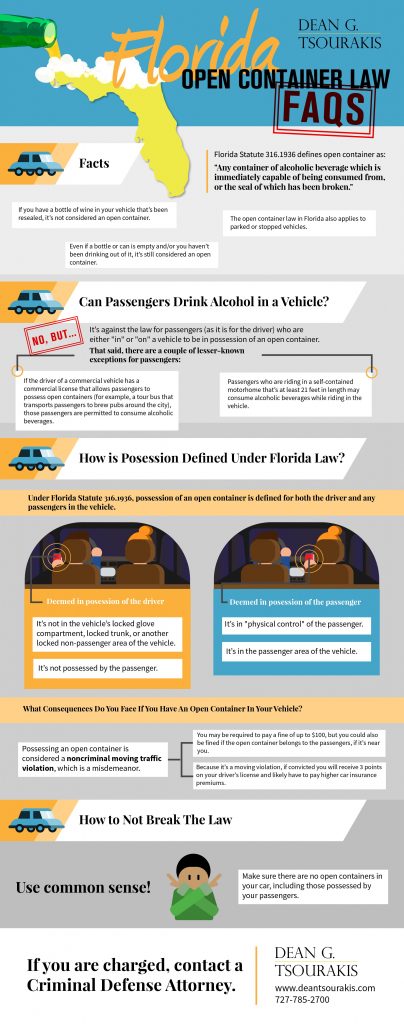Florida’s open container law states that it’s against the law to possess alcoholic beverages in an open container while driving. Florida Statute 316.1936 defines an open container as:
“any container of alcoholic beverage which is immediately capable of being consumed from, or the seal of which has been broken.”
But beyond what’s noted in the definition, what are some key things you should know about the Florida Open Container Law? Here are some frequently asked questions and answers that will give you more insight into the law and the penalties you could face.
What Else Should I Know About Open Containers in Florida?
As you can see above, the definition of “open container” is not very specific, so it’s important to know a few additional facts about the law:
- Even if a bottle or can is empty and/or you haven’t been drinking out of it, it’s still considered an open container.
- The open container law in Florida also applies to parked or stopped vehicles, so if you are parked on a public street outside of your home, it’s against the law to drink alcoholic beverages in your car.
- If you have a bottle of wine in your vehicle that’s been resealed, it’s not considered an open container. So if you go out to a BYOB restaurant, for example, and you don’t finish your bottle of wine, ask the wait staff to put a cork in the bottle. The bottle also needs to be placed in a secure bag or container (with a receipt) and transported in a locked part of the vehicle.
Can A Passenger Drink Alcohol In A Car?
No. Under Florida Statute 316.1936, it’s against the law for passengers (as it is for the driver) who are either “in” or “on” a vehicle to be in possession of an open container. So, no matter where passengers are seated in a vehicle, even if it’s in the cargo bed of a truck, they are not permitted to drink alcoholic beverages while the vehicle is being operated or, in some cases, parked (see above).
That said, there are a couple of lesser-known exceptions for passengers:
- If the driver of a commercial vehicle has a commercial license that allows passengers to possess open containers (for example, a tour bus that transports passengers to brew pubs around the city), those passengers are permitted to consume alcoholic beverages.
- Passengers who are riding in a self-contained motorhome that’s at least 21 feet in length may consume alcoholic beverages while riding in the vehicle.
How Is Possession Defined Under the Florida Open Container Law?
Under Florida Statute 316.1936, possession of an open container is defined for both the driver and any passengers in the vehicle. An open container is deemed in possession of the driver if:
- It’s not possessed by the passenger.
- It’s not in the vehicle’s locked glove compartment, locked trunk, or another locked non-passenger area of the vehicle.
An open container is deemed in possession of the passengers if:
- It’s in “physical control” of the passenger.
- It’s in the passenger area of the vehicle.
What Consequences Do You Face if You Are Driving with an Open Container in Your Vehicle?
It’s important to note that the driver of the vehicle is not responsible for any passengers consuming alcohol in the driver’s vehicle, as long as:
- the open containers are in physical control of the passengers and not in close proximity to the driver, or
- if the open containers are not locked up in another part of the vehicle, such as the trunk or glove compartment
If you are pulled over by a police officer, and you have an open container in your vehicle, the penalties vary. If you are the driver, possessing an open container is considered a noncriminal moving traffic violation, which is a misdemeanor. Typically, you’ll be required to pay a fine of up to $100, but you could also be fined if the open container belongs to the passengers, if it’s near you. In addition, because it’s a moving violation, if convicted, you will receive three points on your driver’s license and likely have to pay higher car insurance premiums.
If you’re the passenger, you are also subject to a fine, although fines are typically a little less than what they would be for the driver.
Also, keep in mind that if a police officer finds an open container in your vehicle, there’s a good chance he or she may think that you are driving under the influence and want to conduct field sobriety or breathalyzer tests. If you are found to be under the influence, you will face more serious penalties, such as higher fines, probation, community service, driver’s license revocation, and/or possible jail time.
What Should I Know About Open Container Laws When I’m Not Driving?
Open container laws can also be enforced when you’re not driving. Depending on local ordinances, you could be cited for possession of an open alcoholic beverage on a public street, sidewalk, or even on private property if you don’t have permission from the owner.
In Clearwater, for example, alcoholic beverages are not permitted on any beaches or public property. The same holds true in Tampa unless you are visiting the Riverwalk area, between the Tampa Bay History Center and Water Works Park. However, open containers are only permitted if you purchase alcohol from designated establishments and are carrying no more than two drinks, which have to be in plastic cups with the Riverwalk logo, and it’s between 11 a.m. and 1 a.m.
FAQs on Open Container Laws in Florida
We will now answer some frequently asked questions about Florida open container laws.
Can Open Containers Be Transported in a Vehicle Legally?
In Florida, the transportation of open containers in a vehicle is subject to specific legal restrictions. An open container, as defined by Florida Statute 316.1936, includes any alcoholic beverage container that is immediately capable of being consumed from or has a broken seal.
Legally, open containers must be transported in a vehicle’s locked glove compartment, locked trunk, or another locked non-passenger area. This means if you have an opened but resealed bottle of alcohol, it should be placed in these secure areas.
Are There Exceptions for Living Areas in RVs or Campers?
Florida’s Open Container Law does include certain exceptions for living areas in RVs (Recreational Vehicles) or campers. According to Florida Statute 316.1936, passengers in self-contained motorhomes of a certain size (at least 21 feet in length) are allowed to consume alcoholic beverages within the living quarters of the vehicle. This exception recognizes the distinct nature of RVs and campers, which often serve as a mobile living space, different from standard vehicles.
However, it’s important to note that the driver of the RV or camper is still prohibited from accessing or consuming alcoholic beverages while the vehicle is in operation. This law aims to maintain road safety while acknowledging the unique use of recreational vehicles.
Does the Open Container Law Apply to Non-Alcoholic Beer?
Under US federal regulations, beer is considered non-alcoholic if it contains 0.5% or less alcohol by volume (ABV). Florida aligns with these federal standards. Generally, consuming non-alcoholic beer in situations where alcoholic beverages are prohibited is not restricted, but local laws and their enforcement can vary.
This means in most cases, drinking non-alcoholic beer in scenarios where alcoholic beverages are banned, like driving, is usually not subject to the same legal constraints as alcoholic beverages. However, it’s always prudent to be aware of specific local laws and exercise caution, especially since the perception of drinking any beer while driving could raise concerns.
Are Open Containers Allowed in Non-Moving Vehicles?
In Florida, the Open Container Law applies not only to vehicles in motion but also to non-moving vehicles. According to Florida Statute Section 316.1936, possessing an open container of alcohol is prohibited in both the driver and passenger areas of a vehicle that is on a public highway, regardless of whether the vehicle is moving or parked. This means that even if a vehicle is stationary, having an open alcoholic beverage in the main cabin is illegal.
Can You Have an Open Container in a Taxi or Ride-Sharing Vehicle?
Passengers are exempt from the open container restrictions if they are in a vehicle operated by a driver with a valid commercial driver’s license and the vehicle is being used for hire, such as a taxi, bus, or limousine.
It’s important to note that most ride-sharing vehicles, such as those used for Uber and Lyft services, do not require a commercial license. Therefore, passengers in these ride-sharing vehicles would be in violation of the open container laws if they possess or consume alcohol inside the vehicle.
What Can You Do to Ensure That You Are Not Breaking Florida Alcohol Laws?
First, use common sense. No matter how far you are driving, make sure there are no open containers in your car, which includes any possessed by your passengers. If you want to bring home an unfinished bottle of wine from a restaurant, follow the directions above and take the time to ensure that the bottle is securely locked away.
If you have been charged with possession of an open container in Florida, it may be in your best interest to contact a criminal defense attorney. After all, the charge will be based on the police officer’s perception of the scene, which is subjective and may be open to scrutiny. In addition, the police officer had to have probable cause to pull you over and search your vehicle, so you may have a defense if that was not the case.
Clearwater Criminal Defense Attorney Dean Tsourakis has the experience to answer all of your questions about the Florida Open Container and DUI laws and can help you with your defense. Call Dean today at 727-785-2700. The initial consultation is free.
Note: This FAQ is intended for informational purposes only and should not be considered legal advice. Laws and interpretations can vary, so consult a legal professional for specific legal guidance.





